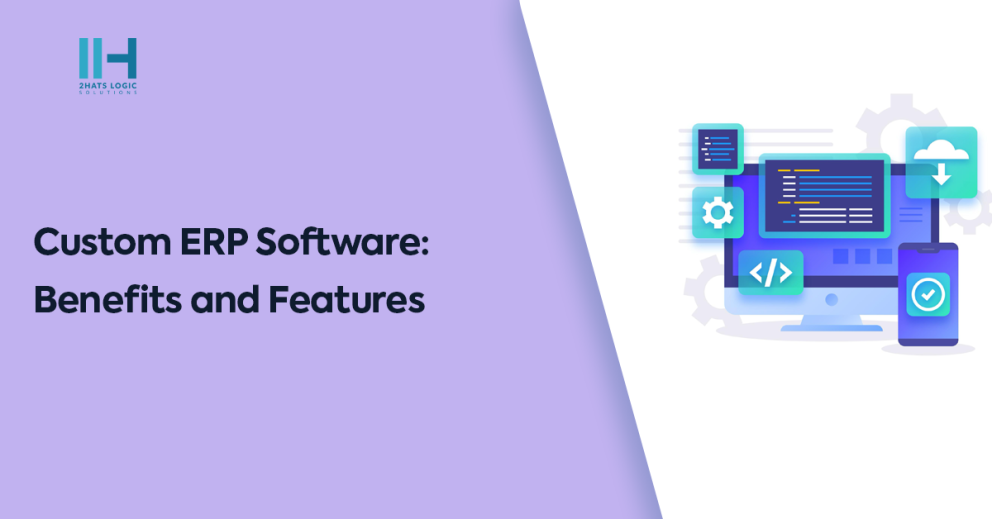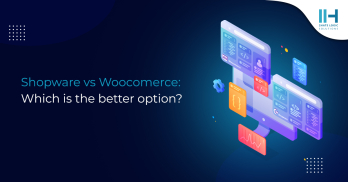Greetings! I'm Aneesh Sreedharan, CEO of 2Hats Logic Solutions. At 2Hats Logic Solutions, we are dedicated to providing technical expertise and resolving your concerns in the world of technology. Our blog page serves as a resource where we share insights and experiences, offering valuable perspectives on your queries.
Data management and usage in a business environment mean that data needs to be managed right and put to maximum use. This is where Custom ERP Software comes in. Enterprise Resource Planning integrates various functions within an organization into a unified system to enhance communication, data flow, and decision-making among departments. Custom software goes the extra mile by adapting solutions to the unique needs and processes of each organization. This article delves deeper into the benefits, key features, and industry-specific applications.
What is ERP Software?
ERP software is a powerful tool that integrates various functions within an organization into a unified system. It smoothens communication and data flow between departments. Whether it’s managing finances, human resources, supply chain operations, or customer relationships. This brings them together with improved efficiency and decision-making ability.
Benefits of custom ERP software
Customized Solutions
It is designed specifically to meet the unique needs and processes of an organisation. This is to ensure it fits its different operations.
Improved Performance
This function aligns with specific business requirements. Custom systems help to improve overall performance, efficiency, and productivity.
Cost Savings
Customisation eliminates unnecessary features and focuses on essential functionalities. This will help to reduce costs associated with licensing and maintenance.
Competitive Advantage
Another benefit of custom ERP solutions is that they enable organisations to differentiate themselves by optimising workflows. They can respond quickly to market changes, and deliver superior customer experiences.
Extensibility
It can easily scale according to the business growth. It can accommodate increased data volumes, user numbers, and operational complexities.
Continued Support
Organisations receive dedicated support and maintenance for the custom systems. To ensure the system remains up-to-date, secure, and aligned with business requirements.
Key Features of ERP Software
An effective ERP software comprises a range of features. They are as follows:
Centralized Database
All the information gathered from different departments is available in one place. This makes the decision-making process easier.
Automated Workflows
Streamlined processes help to automate routine tasks. This will reduce the workload and help save time and effort. Manual errors can be reduced thus it helps to improve operational efficiency.
Real-time Analytics
It provides critical business metrics and performance indicators through real-time access to comprehensive dashboards and reports and assesses resource allocation from one platform.
Integration
Modern ERP systems can be easily integrated with third-party applications and existing legacy systems within an organization.
Customization Options
The main key feature is its flexibility. Its configuration allows businesses to adjust the ERP system to their specific needs, bringing up agility.
Custom ERP Software for Different Industries
ERP for Logistics
- Efficient Transportation Planning
Enables efficient route planning for transportation with travel cost reduction and schedule awareness.
- Tracking of Shipments
Real-time tracking of shipments provides visibility and improves customer satisfaction.
- Effective Inventory Management
Effective inventory management of the warehouses reduces instances of stockout and improves the operational efficiency of the operations.
- Automation of Processes
Automation of order processing, billing, and shipment tracking simplifies operations and reduces the chances of manual errors.
ERP for Manufacturing
- Efficient Manufacturing Planning
Enables seamless manufacturing planning, thereby improving the utilization of resources and reducing downtime.
- Real-time Inventory Views
Provides real-time views of inventory that aid efficient management of stock levels and reduce waste.
- Enabling Quality Control
Sustains quality control measures that enhance product consistency and customer satisfaction.
- Reduction in Cost and Productivity
Increases efficiency, reduces costs and enhances productivity on the shop floor.
ERP for Hospitals
- Billing and Scheduling Management
Efficiently manages billing and scheduling processes that support good financial management and resource allocation.
- Patient Record Management
Centralization of the management of patient records helps ensure data accuracy and compliance while ensuring superior patient care.
- Optimization of Revenue
Enables revenue optimization through streamlined billing processes and superior financial visibility.
- Efficient Operations
Enhances overall operational efficiency by bringing together all the activities of a hospital into one system.
ERP for Small Business
- Centralization of Data
Gathered all the business data under one roof, simplifying data management and ensuring data accuracy.
- Decision Making
The ability to make informed decisions based on real-time data insights enhances strategic planning and agility.
- Better Customer Service
Better customer service through streamlined processes and improved responsiveness.
- Facilitating Change and Growth
Facilitates adaptability to changes in the marketplace and sustainability in growth for small businesses.
Conclusion
Custom ERP software development is the key to a lot of businesses, which expect customized solutions. This can efficiently manage data, improve performance, cut costs, and gain a competitive advantage. If you are looking for customized ERP software contact us for expert solutions. Using the advantages and key features in different industries, organizations can still manage to streamline their operations and increase their productivity
FAQ
What are the different types of ERP software available in the market?
There are several types of ERP software available in the market, including cloud-based ERP, on-premise ERP, open-source ERP, industry-specific ERP, and hybrid ERP systems. Each type caters to different business needs and preferences, offering varying levels of flexibility, scalability, and customization.
What are the key considerations when choosing an ERP software provider?
When selecting an ERP software provider, key considerations include evaluating the vendor's reputation, experience, industry expertise, scalability of the solution, integration capabilities, ongoing support and maintenance, data security measures, compliance with regulations, and total cost of ownership (TCO).
How does ERP software contribute to supply chain management?
ERP software contributes to supply chain management by optimizing inventory management, improving demand forecasting accuracy, enhancing supplier relationships through better communication and data sharing, reducing lead times and costs, increasing visibility across the supply chain, and streamlining order fulfilment processes.
Can ERP software integrate with existing legacy systems?
Yes, modern ERP software solutions are designed to integrate seamlessly with existing legacy systems. They utilize integration tools, APIs (Application Programming Interfaces), and middleware to bridge the gap between legacy systems and newer ERP technologies, ensuring data consistency, interoperability, and smooth transition during implementation.

Related Articles







